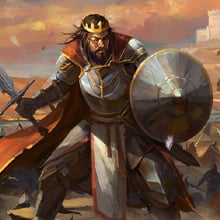
RPG Games
Discover 15 amazing rpg games. Play for free and have fun!
About RPG Games
What Are RPG Games?
Role-playing games (RPGs) are a genre of video games where players assume the roles of characters in a fictional setting. These characters often embark on quests and adventures, leveling up and acquiring new abilities, gear, and skills as they progress. RPGs are known for their deep narratives, character development, and immersive worlds.
The detailed environments, compelling stories, and richly developed characters help players escape reality and become fully immersed in the game world. The fantastical and futuristic settings of many RPGs provide a break from everyday life, allowing players to explore and engage with imaginative scenarios and environments.
The RPG genre has its origins in tabletop gaming. The late 1970s and early 1980s witnessed the emergence of digital role-playing games, initially on mainframe computers. During the 1980s and 1990s, the RPG genre flourished, particularly on home computers and early gaming consoles. The 2010s continued to see innovation within the RPG genre, with notable trends as open-world design, Indie and Retro RPGs…
How RPG Games Attract Too Many Players?
Role-playing games (RPGs) have consistently captivated the hearts of gamers due to their rich, multifaceted appeal. Here are some of the primary reasons why RPGs are so beloved:
Deep and Engaging Storylines: These games frequently have deep, well-developed narratives that pull players into their worlds. The narratives are epic in scope, delving into themes of heroism, conflict, and adventure, creating a truly immersive experience. Furthermore, many RPGs emphasize on characters' personal journeys, allowing players to get emotionally invested in their growth, relationships, and fate.
Character Customization and Development: Players can create and personalize their characters, choosing everything from physical appearance to skills and abilities. This level of customization fosters a deeper connection between the player and their in-game avatar. Furthermore, the progression systems in RPGs, which involve leveling up and gaining new abilities, are satisfying and motivating. Players enjoy seeing their characters become more powerful and capable over time, providing a sense of growth and achievement.
Player Agency and Choice: Many games in this category have branching stories and numerous endings depending on the player's choices. This gives players a sense of control and ownership over the narrative, making their journey unique. Additionally, the inclusion of moral and ethical dilemmas adds depth to the gameplay, encouraging thoughtful engagement with the story and the world.
Social Interaction and Multiplayer: Massively multiplayer online role-playing games (MMORPGs), such as World of Warcraft, provide social experiences in which players can team up with friends or strangers to overcome difficulties, creating a sense of community and shared achievement. Even in single-player RPGs, players frequently share their stories and experiences with others, creating a community centered on the game's lore and gameplay.
The Future Of RPG Games
In the 2020s, RPGs continue to evolve by harnessing technological improvements and exploring new narrative and gameplay possibilities:
Immersive Technology: Virtual reality (VR) and augmented reality (AR) are being integrated into RPGs, providing more immersive experiences.
Hybrid Genres: RPG elements are increasingly found in other genres, such as action-adventure, survival, and even shooter games, blurring traditional genre boundaries.
Cultural and Narrative Diversity: Modern RPGs are embracing more diverse settings, stories, and characters, reflecting a broader range of cultural perspectives and player experiences.















